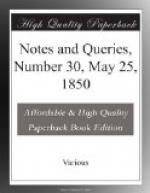The pious builder of a church being desirous, according to custom, of putting a bell in the turret, engaged a skillful craftsman to carry into effect his design. This man, “at the instigation of the devil,” stole some of the metal with which he had been furnished for the work; and the bell was, in consequence, mis-shapen and of small size. It was, however, placed in the turret; but, as a divine punishment for his crime, whenever the bell was struck, the dishonest founder was thereupon seized with frenzy, uttering strange words and barking like a dog!
GASTROS.
* * * * *
ORIGIN OF THE WORD “NEWS.”
I have great respect for “Mr. SAMUEL HICKSON,” but I cannot treat his derivation of the word “News” with any respect (No. 27. p. 428.). I wish “Mr. HICKSON” had been a little more modest in his manner of propounding his novelty. Can any thing be more dogmatic than his assertions? which I will recapitulate as much as possible in his own words, before I proceed to deal with them.
1. “I have never had the least doubt that this word is derived immediately from the German.”
2. “It is, in fact, ‘das Neue’ in the genitive case;” and “Mr. H.” proceeds to mention the German phrase, “Was giebt’s Neues?” as giving the exact sense of our “What is the news?” [which cannot be gainsaid; but I shall have a word to say presently about neues in that phrase being the genitive case.]
3. “That the word is not derived from the English adjective ’new,’—that it is not of English manufacture at all—I feel well assured.”
4. “In that case ‘s’ would be the sign of the plural; and we should have, as the Germans have, either extant or obsolete, also ‘the new.’” [I do not see the sequitur.]
5 “‘News’ is a noun singular, and as such must have been adopted bodily into the language.”
Such are “Mr. HICKSON’s” principal assertions: and when I add, that he has found out that the German “neu” was in olden time spelt “new,” so that the genitive, “newes,” was identical with the old form of the English word “news;” and that he explains the transformation of a genitive case of a German adjective into an English substantive by English ignorance, which he further thinks is exemplified by the Koran having been called “the Alkoran,” in ignorance of “Al” meaning “the,” I have given not only all of his assertions, but also the whole of his argument.
I now proceed to assert on my part that the word “news” is not “derived immediately from the German,” and “has not been adopted bodily into our language;” that the English “new” and German “neu” have, however, of course the same origin, their common root being widely spread in other languages, as [Greek: neos], Gr.; norus, Lat.; neuf, Fr., &c.; that “news” is a noun of plural form and plural meaning, like goods, riches, &c.; that its peculiar and frequent use is quite sufficient




